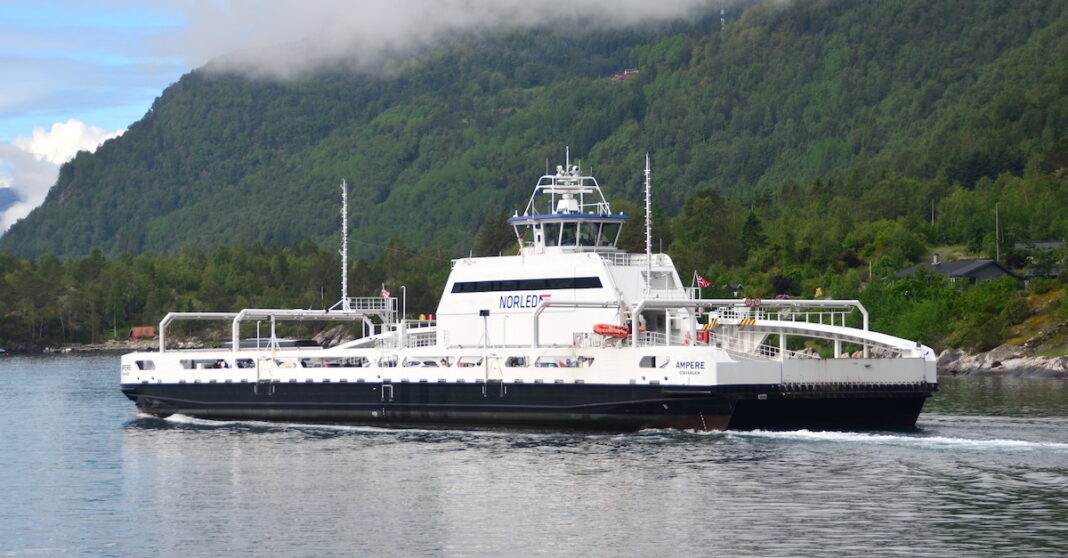The alternative energy field is pressing forward every day — car manufacturers are offering electric and hybrid versions of their most popular models, solar energy companies are thinking of creative and innovative ways to maximize power output, and climate goals are being set by federal and state lawmakers.
But on Martha’s Vineyard, just as Teslas, Rivian trucks, and Nissan Leafs begin to populate roadways, one of the greatest emission producers on-Island continues to be our lifeline transportation service — the Steamship Authority. An upcoming event on March 31 at the Martha’s Vineyard Film Center, called Ferries Now, will bring additional clarity to the topic of electric ferries. From 10:30 am to 2:30 pm, experts from the Island, Maine, Washington State, and Denmark will speak to electrification initiatives in each community. (See event note below.)
Kate Warner, energy planner for the Martha’s Vineyard Commission, told Bluedot Living that the event is meant to be educational, and to clear up some common misconceptions about electric ferries.
Ferries Now is going to show people that ferry fleets all over the world are looking at being converted to alternative propulsion, primarily using hybrid solutions with batteries.
–Kate Warner, MVC energy planner
“When I have gone to some Steamship Authority Board meetings, one thing they always say is ‘we don’t want to move forward electric ferries or alternative propulsion of any kind, because we don’t want to be on the cutting edge,’” Warner explained. “Ferries Now is going to show people that ferry fleets all over the world are looking at being converted to alternative propulsion, primarily using hybrid solutions with batteries.”
Another aspect the SSA notes as being an obstacle to electrification is the organization’s reliance on ferry fares. Warner said a number of transportation entities attending Ferries Now do not rely entirely on ticket sales, and are connected directly with their Department of Transportation. “I spoke to a woman from North Carolina who is working on electrifying the Outer Banks of North Carolina. Her office is part of the DOT. Mark Higgins, manager of the Maine State Ferry Service, will also speak at the event; his office is also tied in with the DOT.
The SSA must first establish a strategic plan that lays out which boats will be retrofitted and when, which boats will be replaced entirely, and what kinds of infrastructure will be required to charge the boat.
Warner said there is a bevy of federal funding opportunities available for transitioning ferries to alternative propulsion methods. “About a month ago, a report came out listing what the federal government has funded in grants for these kinds of initiatives — it’s phenomenal,” Warner said. Before any grants are eyeballed, the SSA must first establish a strategic plan that lays out which boats will be retrofitted and when, which boats will be replaced entirely, and what kinds of infrastructure will be required to charge the boats. “You don’t electrify a fleet overnight — Washington State’s plan is going to take about 15 years. You can’t apply for these federal grants without a really fleshed-out and precise plan,” Warner said.
Other people are really trying for first place — we just need to get moving.
–Kate Warner
While the SSA is concerned about being on the cutting edge of these changes, other companies in other states and countries are working hard to lead the charge. Warner said preliminary reports from the North Carolina ferry system suggest that they will have the first fully electric ferry on the East Coast, while a number of other organizations are also looking to come out ahead of the electric ferry wave. “Other people are really trying for first place — we just need to get moving,” Warner said.
For Warner, the concept of electric ferries isn’t abstract or far off — it’s fully attainable, especially with so many other larger transportation companies at the head of the pack. “Washington State is the largest ferry company in the United States. Their large boats are twice the size of the Island Home, both in size and in the number of cars and passengers,” Warner said. “If they can come up with a plan, we can come up with a plan.”
Eversource is another major piece of the puzzle on Martha’s Vineyard. A representative from the energy company will be at Ferries Now to describe how the electrical infrastructure could be put in place to charge the boats at each port. In an alternative propulsion report created in May of 2022 by Elliot Bay Design Group for the SSA, a separate section laid out by design firm KPFF established a draft plan for both the Woods Hole and Vineyard Haven ports. The draft plan describes what equipment and infrastructure would be needed to charge the ferries.
Apart from increased reliability and decreased maintenance costs for ferries, Warner said one of the greatest drivers for this undertaking should be reduced emissions. “Right now if you look around Woods Hole or Vineyard Haven, there is soot on all the buildings. As port towns, a reduction in emissions would greatly benefit both Woods Hole and the ports on the Island,” Warner said.
The live event at the Film Center is sold out, but is available for viewing via Zoom. Info is here, or email Kate Warner at wa****@mv**********.org

